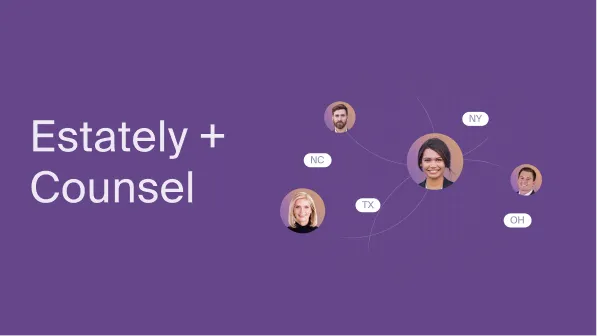Offering estate planning can be an effective way for a financial advisor to expand their services, attract new clients, and retain accounts through generational wealth transfers to heirs and other beneficiaries. However, tackling estate planning means having deeply personal conversations with clients and their loved ones. Engaging clients about sensitive legal matters may seem daunting at first. But financial advisors who take on estate planning often find it both professionally and personally rewarding.
Providing estate planning services goes beyond just helping clients to coordinate their estate planning documents. Estate planning also gives financial advisors a unique opportunity to build intergenerational relationships with high net worth clients, enabling the continued management of assets when wealth is eventually transferred to heirs.
In this article, we will look at the basic documents involved in estate planning, how to start the conversation with prospects and clients, and how to build the kind of lasting client relationships that help financial advisors grow their businesses.
Key Estate Planning Documents
For financial advisors looking to add estate planning to their portfolio of services, it is important to become a subject matter expert on certain legal documents that clients often require. Here are just a few examples:
- Last Will and Testament: Provides a set of instructions for the distribution of your client’s property that take effect upon their death. This includes nominating an executor to carry out those instructions. All assets deposed via a will must go through probate.
- Revocable Living Trust: Provides a set of instructions for assets to be held within a trust to be used to care for your client and their family during their lifetime, during incapacity, and after death. While a trust must be funded by relevant assets, it has the advantage of avoiding probate.
- Durable Power of Attorney: A legal document that can be used for your client to designate someone else to make financial decisions on their behalf in the event they should become incapacitated. This includes naming a primary decision maker and may prevent a conservatorship.
- Advance Healthcare Directive: A legal document that specifies the client’s wishes for end-of-life healthcare, and who should make healthcare decisions on their behalf if they are unable to do so. It is also known as a living will, advance directive, or medical directive.
When talking to clients about legal documentation, it is important to be an educated authority on these issues in order to effectively facilitate end of life planning. But it is also required for financial advisors to refrain from providing legal advice during this process and to, if necessary, involve a lawyer when more complicated situations arise.
How to Engage Clients in Estate Planning
Estate planning goes beyond simply ensuring a client has a will or trust. Done right, it helps an advisor dig deeper into the client's life, uncovering new opportunities and organic referrals. In order to win new business, financial advisors who aim to integrate estate planning into their practice must focus on building trust, fostering meaningful conversations, and addressing key areas where traditional planning might fall short.
Start with an Open Conversation: The initial meeting with a prospective client should focus on building rapport and trust. Instead of launching into a pitch, emphasize the purpose of getting to know each other and understanding each other’s goals. This de-escalates potential sales pressure and sets the stage for a genuine dialogue. Clients feel more comfortable and are more likely to share their true concerns and goals.
Acknowledge Their Accomplishments: When discussing estate planning, it’s important to recognize the work clients have already done. This could include working with other advisors, setting up a will, or achieving significant financial success. Acknowledging their efforts helps disarm skepticism and positions you as a partner who respects their achievements rather than someone trying to upend their existing plans.
Highlight the Common Gaps in Estate Plans: Even clients with a will or basic estate plan may not have addressed critical areas such as:
- Business Succession: Many business owners’ wealth is tied up in their business. Discuss scenarios where the transition of ownership could become complicated, especially if some children are involved in the business and others are not.
- Estate Distribution and Equalization: Explore how to fairly allocate wealth among heirs while preserving harmony. For example, if one child inherits the business, how will the other children be compensated?
- Asset Protection: Ensure that their wealth is safeguarded against potential risks, such as lawsuits or creditors.
Connect Estate Planning to the Future and Family Legacy: For many clients, especially business owners, estate planning is about more than money—it’s about legacy. Tie your services to their emotional goals, such as ensuring their wealth strengthens family bonds rather than causing division. Help clients envision the potential challenges of inadequate planning and the benefits of a well-thought-out estate strategy. Make clear the risks of neglecting areas like business succession or family disputes over inheritance. At the same time, emphasize the peace of mind and clarity that comes from comprehensive planning.
Asking the Right Questions
Getting to know your client’s needs and specific wishes is an essential part of executing their estate plan. It’s a lot to unpack with any client, especially higher net worth clients with more complicated estates or those with large or blended families. Every client is different and identifying their unique needs and ideal solutions requires exploring values, discussing family and legacy goals, planning for life milestones, and focusing on generational opportunities. Here are a few questions to get the conversation started once a prospect expresses interest in creating or updating their will:
- What’s most important to you when you think about your financial future and the life you’re building for your family?
- If you could help your family achieve one big goal, like homeownership, education, or starting a business, what would it be?
- What major life events do you see coming up in the next few years that you’d like to plan for?
- What opportunities do you want to create for your children or grandchildren that you didn’t have growing up?
Key topics to cover in the conversation
Once you and your prospective client are aligned on the primary estate planning goals, you will need to guide them through the materials they will need to gather, the decisions they have to make, and the individuals they need to involve, whether that be heirs or other beneficiaries. Here are a few of the key issues you will need to discuss:
- Distribution of assets: How does your client want their property, investments, and sentimental items allocated among heirs? Are there any conditions they want to place on inheritances, like age restrictions or incentive trusts?
- Executor and trustee selection: Your client should explain who they've chosen to manage their estate and trusts, and why. Naming backups is also wise. Discuss the responsibilities of these roles and confirm that appointees are willing to serve.
- Guardianship for dependents: If your client has minor children or adult dependents, specifying guardianship is critical.
- Healthcare decisions: A healthcare power of attorney allows your client to designate someone to make medical choices on their behalf if they become incapacitated. Your client should share their selection and discuss any advance directives regarding end-of-life care, organ donation, etc.
- Business succession: For clients who own a business, the estate plan should include instructions for ownership transfer or sale. Heirs need to understand your client's vision for the future of the company. Addressing leadership transition and buy-sell agreements is also important.
- Charitable giving: If philanthropy is part of your client's legacy, guide them in explaining any charitable bequests, donor-advised funds, or private foundations they've established.
Building Relationships that Last
Helping a client manage their estate is a personal process that deepens the relationship a financial advisor has with their client. It also facilitates the continued relationship an advisor may have with an estate across multiple generations. Conversations with family members, heirs, and other beneficiaries are often a key part of working out an estate plan with a client. Through estate planning, financial advisors are given the opportunity to build these relationships, expanding their personal and professional ties to each estate.
Estate planning opens the door for financial advisors to find new clients and add value to their existing client base. If you’re interested in learning more about how to get started in estate planning, book a demo with our sales team to discuss how Estately can simplify the process for you and your clients.



